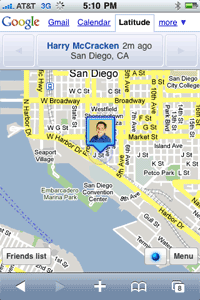 Google’s Latitude–which lets you use your phone to share your location with friends–has finally debuted on the iPhone, months after it showed up for Android, BlackBerry, and Windows Mobile. On the iPhone, it’s a Safari-based Web app rather than an iPhone app. But it’s apparently only a Web app because Apple was unhappy with the native app that Google developed. “We worked closely with Apple to bring Latitude to the iPhone in a way Apple thought would be best for iPhone users,” says the Google blog post announcing the iPhone version. “After we developed a Latitude application for the iPhone, Apple requested we release Latitude as a web application in order to avoid confusion with Maps on the iPhone, which uses Google to serve maps tiles.”
Google’s Latitude–which lets you use your phone to share your location with friends–has finally debuted on the iPhone, months after it showed up for Android, BlackBerry, and Windows Mobile. On the iPhone, it’s a Safari-based Web app rather than an iPhone app. But it’s apparently only a Web app because Apple was unhappy with the native app that Google developed. “We worked closely with Apple to bring Latitude to the iPhone in a way Apple thought would be best for iPhone users,” says the Google blog post announcing the iPhone version. “After we developed a Latitude application for the iPhone, Apple requested we release Latitude as a web application in order to avoid confusion with Maps on the iPhone, which uses Google to serve maps tiles.”
Of course, this is the iPhone we’re talking about, so Apple’s requests aren’t really requests; if it had a problem with the native version of Latitude, it would presumably never the the light of day in the App Store. I’m not entirely clear on why Apple believed that Latitude would confuse iPhone owners, since Apple not only permits other mapping-related apps to be distributed on the App Store but encourages their creation by helping developers embed maps in their wares. And Latitude’s functionality is almost completely unrelated to what you get in Apple’s Maps app.
Also, iPhone owners aren’t dummies, and at least some of us would rather risk the possibility of being confused in return for the possibility of being pleased by a useful new app.
That said, the Web-based version of Latitude is impressive stuff. Google builds some of the best iPhone Web apps there are–like its iPhone-ized version of Gmail–and it’s hard to imagine that a native iPhone version would be much better than what it’s done in Safari. Latitude for the iPhone has one fundamental limitation that the other versions don’t: It can’t broadcast your location to your buddies unless you’re running the app. But it would have to deal with that even it were a native iPhone application, since Apple doesn’t permit third-party software to run in the background. (If the company doesn’t loosen up the multitasking limitations, maybe it can add some sort of ability for a GPS-related app to continue to send your location even when it’s not running, akin to the Push Notifications the iPhone already has.)
In the long run, apps like Latitude and Glympse might end up being features in a program like the iPhone’s Maps, not standalone software. For now, though, I want them to flourish–and I’m sorry that Apple thinks they’d befuddle us, and that its monopoly on distribution of iPhone apps means its gut check on such matters is gospel.

 You’re a really busy person. I’m a really busy person. Enter our new feature, 5words. It consists of quick news hits from around the Web–and just to keep things moving right along, every item will be five words long. (If that leaves you hungry for more, click the links to get more words on these stories elsewhere–hundreds of them, sometimes.) Here we go…
You’re a really busy person. I’m a really busy person. Enter our new feature, 5words. It consists of quick news hits from around the Web–and just to keep things moving right along, every item will be five words long. (If that leaves you hungry for more, click the links to get more words on these stories elsewhere–hundreds of them, sometimes.) Here we go…